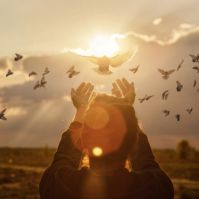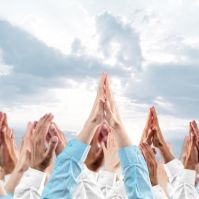 While it is sometimes seen as more of a philosophy than a religion in the United States and other Western countries, it is important to remember that Buddhism does in fact have a religious structure and many deeply faithful followers. Almost 7% of the world's population claim Buddhism as their primary religion. This group has to cope with and respond to different global events just like any other organized religion. The way that the leaders respond provides direction for followers and serves as a catalyst for action. Here's how Buddhism can be both similar to and slightly different from other groups in its reactions to recent events.
While it is sometimes seen as more of a philosophy than a religion in the United States and other Western countries, it is important to remember that Buddhism does in fact have a religious structure and many deeply faithful followers. Almost 7% of the world's population claim Buddhism as their primary religion. This group has to cope with and respond to different global events just like any other organized religion. The way that the leaders respond provides direction for followers and serves as a catalyst for action. Here's how Buddhism can be both similar to and slightly different from other groups in its reactions to recent events.
Staying Calm in the Midst of COVID-19
COVID-19 caught many religions off guard by forcing members to socially distance from one another. While from an outside perspective, Buddhism often seems like a more personal type of religion in which practicing without being able to meet in large groups may be more tolerable, its followers have felt the hardship of recent changes just like every other major religion. As with others, the locations they find themselves limited to vary, with some being at home with their families and others living with roommates or in other group living conditions that can sometimes make quarantine uncomfortable.
Many Buddhists continue to try and emphasize the importance of compassion and meditation as they find themselves trapped. Motivated by video streams of leaders, such as senior monks and other representatives from large Buddhist groups, they have taken the opportunity to focus on introspection and working on their own sense of peace during these tumultuous times. Buddhism is a religion with its own set of mystic practices, which include healing rituals and other traditions. While these more supernatural elements of the religion often go overlooked in Western societies, they have become an important part of coping and spiritual healing for many.
Responding to the Black Lives Matter Movement
In addition to continuing to struggle with COVID-19, the United States and the wider world have been affected by the recent explosion of the Black Lives Matter movement and outcries against racism. Amidst the clashes between protestors, government officials, and right-wing hate groups, many religious groups have given statements to show their support for those struggling to be heard. One of the most important figures in Buddhism, the Dalai Lama, offered his own response to this situation. In a live stream, he referred to the unjust deaths of African Americans as an example of the terrible things that happen when people don't have compassion and kindness in their hearts. This statement was part of a larger lesson he has been teaching during the global pandemic on the importance of being emotionally open and caring towards one's fellow human beings.
Many Buddhist organizations have seen recent events as a wake-up call and have put an emphasis on being more inclusive in their groups as a result. Mourning and meditation related to the death of George Floyd and other African Americans who have lost their lives to police brutality have been encouraged, as has offering support to members of color within the organization as well as the wider world.
Emphasizing Compassion and Human Camaraderie
Recent months have seen a flood of unexpected and potentially disruptive events that have spread across the world. As with other religions, Buddhist leaders and organizations have offered their opinions and insight into current issues as a way to offer direction to their members and make their position as a group more clear. Buddhism can be unique in its emphasis of compassion and the importance of caring for all humans as a large family. Despite difficult circumstances, kindness remains of utmost importance to practicing members, as do meditation and self-reflection.



